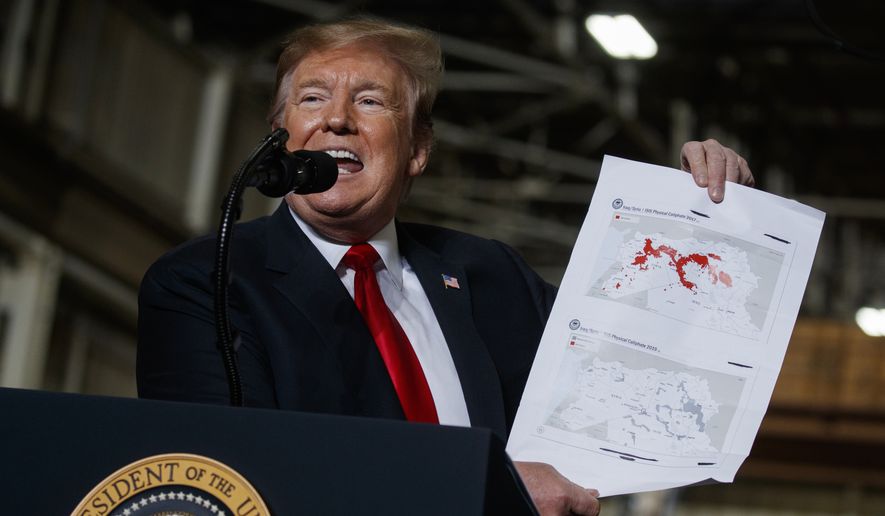The Islamic State’s physical caliphate is now in ruins, but the Trump administration is talking about keeping the broad international coalition in place to counter the terrorist group’s efforts to reorganize and reform in emerging hot spots around the globe, a top Pentagon official said in an interview.
U.S. military officials are trying to lock in commitments from counterparts from all 79 coalition members to continue the group’s work in places such as Southeast Asia, and State Department diplomats are working with their foreign ministry counterparts to firm up a more structured alliance, Kathryn Wheelbarger, assistant secretary of defense for international security affairs, said in an exclusive interview with The Washington Times.
U.S. and coalition officials anticipate finalizing an agreement to extend the “Defeat ISIS” mission during the NATO ministerial meeting set for June.
Keeping the international alliance intact “maintains the stability and strength of the coalition as the fight transitions” from the conventional war in Iraq and Syria to an underground fight against rising Islamic State cells around the globe, Ms. Wheelbarger said. “We expect the threat to evolve, [and] the importance of the coalition is our priority.”
The Trump administration remains dedicated to withdrawing most of the 2,000 American troops from Syria over the next several months, but officials have agreed to leave a 400- to 600-member force to oversee stability operations.
Ms. Wheelbarger said efforts to keep the coalition intact were underway even as the Trump administration weighed the future of the mission inside Syria.
The U.S.-led joint military deployment that backed Arab and Kurdish forces in the fight against the Islamic State’s caliphate over the past five years will be largely abandoned in favor of increased intelligence-sharing and training of local troops by coalition members, said Ms. Wheelbarger. “This is not just a military coalition,” she said.
“The need to maintain the global coalition is to avoid the need for a robust military coalition,” she said.
The new effort, she said, “looks much different than Operation Inherent Resolve,” the Pentagon’s name for the mission against the Islamic State.
The post-caliphate coalition will focus more on economic and diplomatic support for countries facing the Islamic State threat, enabling those allies to combat the group’s efforts to gain inroads into their countries, Ms. Wheelbarger said. In addition to fighters still hiding in Syria and Iraq, the Islamic State has a significant presence in countries including the Philippines and Afghanistan in Asia, and Libya, Yemen, Somalia, Mali and Nigeria in the Middle East and Africa.
“We have to be able to use all the tools of governance to address the challenge” on the spread of the Islamic State, particularly its extremist ideology, which continues to draw adherents around the globe.
Potent threat
The effort to preserve the coalition tracks with U.S. intelligence and private analyst assessments that the terrorist group remains a potent threat despite the loss of all of its territory in the Middle East.
“While this is a critical milestone in the fight against ISIS, we understand our work is far from complete,” acting Defense Secretary Patrick M. Shanahan said last month as the final Islamic State redoubts were falling to U.S.-allied local militias.
The international coalition cobbled together by Washington and its allies to defeat the Islamic State on the ground will become even more important during the strategic shift, Ms. Wheelbarger said.
“We cannot be shortsighted or complacent” on the national security challenges posed by [the Islamic State] despite the loss of its physical caliphate, she said. But the coalition “remains an [Islamic State] focus; it is not expanding,” she said.
She said a main strength of the coalition is that its 79 members are united in the belief that the Islamic State is a genuine threat to international and their own security.
“There is not much of a need to talk about if there is a threat” from the Islamic State, Ms. Wheelbarger said. “It is not a debate that we are in challenging times.”
Even as the terrorist group recedes in Syria and Iraq, Islamic State affiliates are gaining prominence among extremist groups in Africa and Asia.
In Africa, elements of al Qaeda’s West African cell, known as al Qaeda in the Islamic Maghreb, have slowly shifted allegiance to the Islamic State in the Greater Sahara and expanded across the Sahel region. In Southeast Asia, the Philippine Islamic State affiliate known as the Maute Group carries out terrorist attacks in the Muslim-majority south, and remnants of al Qaeda’s Indonesian cell, Jemaah Islamiyah, have pledged allegiance to the Islamic State.
In southwest Asia, an Islamic State cell continues to hold sway in war-torn Afghanistan, stoking sectarian violence with high-profile attacks from its base in eastern Nangarhar province.
Those challenges have tempered expectations inside the White House to end the fight against the Islamic State in the Middle East and elsewhere.
The Islamic State also has the ability to carry out guerrilla strikes in Iraq and Syria even without its territorial base.
U.S. special operations forces adviser units along with Arab and Kurdish paramilitary forces continue to battle pockets of Islamic State resistance in Baghouz, weeks after its liberation from the terrorist group.
American and local forces killed a would-be Islamic State suicide attacker in northeast Syria’s Hasakeh province on Tuesday, The Associated Press reported. It was the first significant Islamic State attack on American advisers since the fall of the caliphate.
• Carlo Muñoz can be reached at cmunoz@washingtontimes.com.




Please read our comment policy before commenting.